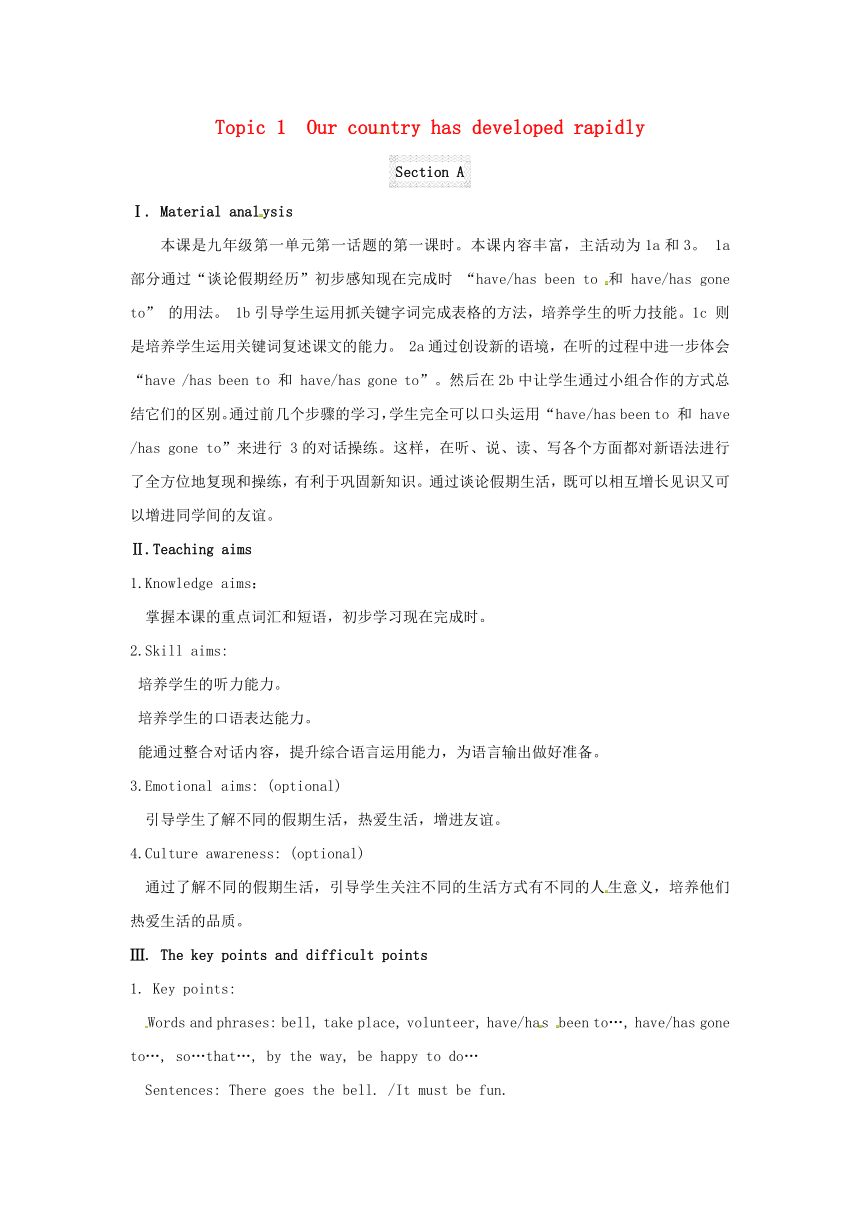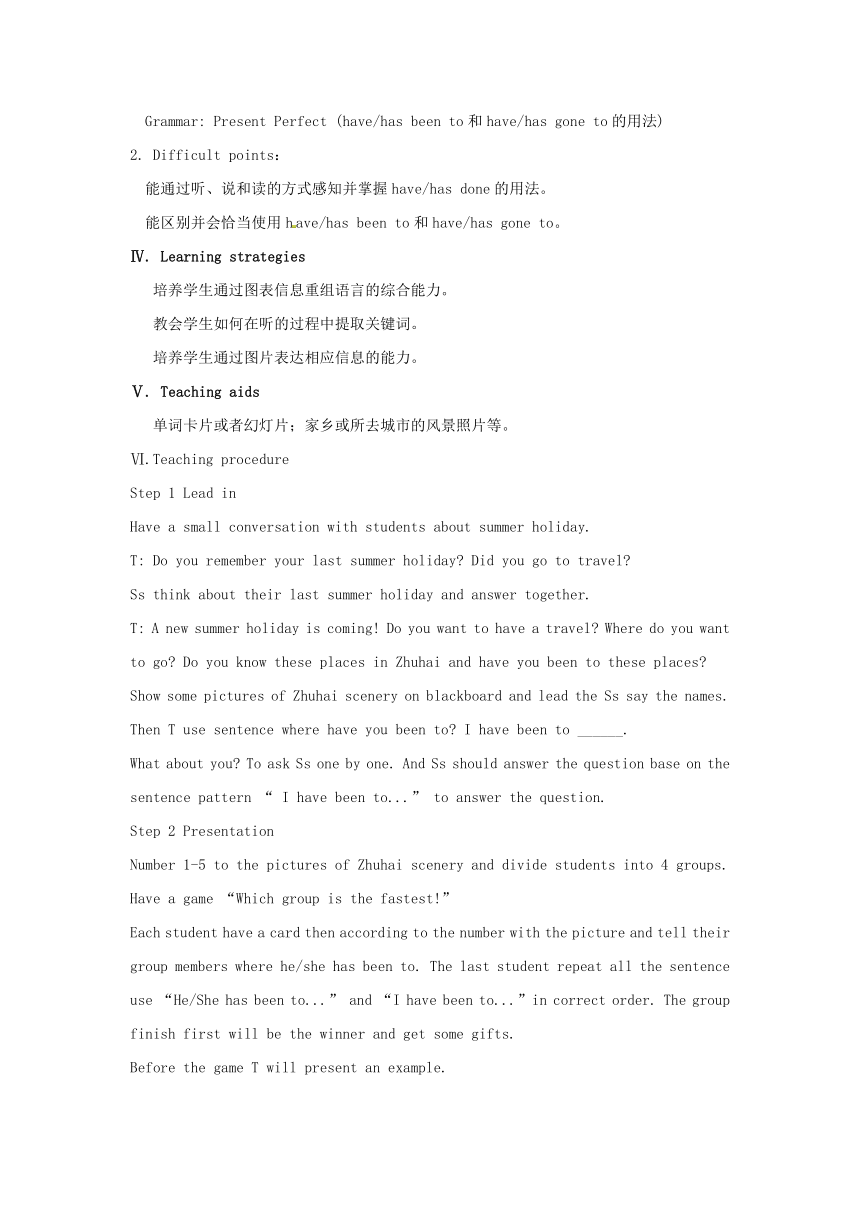仁爱科普版九年级上册 Unit1 The Changing World Topic1 Our country has developed rapidly. SectionA 教案
文档属性
| 名称 | 仁爱科普版九年级上册 Unit1 The Changing World Topic1 Our country has developed rapidly. SectionA 教案 |

|
|
| 格式 | doc | ||
| 文件大小 | 98.5KB | ||
| 资源类型 | 教案 | ||
| 版本资源 | 仁爱科普版 | ||
| 科目 | 英语 | ||
| 更新时间 | 2022-10-08 00:00:00 | ||
图片预览


文档简介
Topic 1 Our country has developed rapidly
Section A
Ⅰ. Material analysis
本课是九年级第一单元第一话题的第一课时。本课内容丰富,主活动为1a和3。 1a部分通过“谈论假期经历”初步感知现在完成时 “have/has been to 和 have/has gone to” 的用法。 1b引导学生运用抓关键字词完成表格的方法,培养学生的听力技能。1c 则是培养学生运用关键词复述课文的能力。 2a通过创设新的语境,在听的过程中进一步体会“have /has been to 和 have/has gone to”。然后在2b中让学生通过小组合作的方式总结它们的区别。通过前几个步骤的学习,学生完全可以口头运用“have/has been to 和 have /has gone to”来进行 3的对话操练。这样,在听、说、读、写各个方面都对新语法进行了全方位地复现和操练,有利于巩固新知识。通过谈论假期生活,既可以相互增长见识又可以增进同学间的友谊。
Ⅱ.Teaching aims
1.Knowledge aims:
掌握本课的重点词汇和短语,初步学习现在完成时。
2.Skill aims:
培养学生的听力能力。
培养学生的口语表达能力。
能通过整合对话内容,提升综合语言运用能力,为语言输出做好准备。
3.Emotional aims: (optional)
引导学生了解不同的假期生活,热爱生活,增进友谊。
4.Culture awareness: (optional)
通过了解不同的假期生活,引导学生关注不同的生活方式有不同的人生意义,培养他们热爱生活的品质。
Ⅲ. The key points and difficult points
1. Key points:
Words and phrases: bell, take place, volunteer, have/has been to…, have/has gone to…, so…that…, by the way, be happy to do…
Sentences: There goes the bell. /It must be fun.
Grammar: Present Perfect (have/has been to和have/has gone to的用法)
2. Difficult points:
能通过听、说和读的方式感知并掌握have/has done的用法。
能区别并会恰当使用have/has been to和have/has gone to。
Ⅳ. Learning strategies
培养学生通过图表信息重组语言的综合能力。
教会学生如何在听的过程中提取关键词。
培养学生通过图片表达相应信息的能力。
Ⅴ. Teaching aids
单词卡片或者幻灯片;家乡或所去城市的风景照片等。
Ⅵ.Teaching procedure
Step 1 Lead in
Have a small conversation with students about summer holiday.
T: Do you remember your last summer holiday Did you go to travel
Ss think about their last summer holiday and answer together.
T: A new summer holiday is coming! Do you want to have a travel Where do you want to go Do you know these places in Zhuhai and have you been to these places
Show some pictures of Zhuhai scenery on blackboard and lead the Ss say the names.
Then T use sentence where have you been to I have been to ______.
What about you To ask Ss one by one. And Ss should answer the question base on the sentence pattern “ I have been to...” to answer the question.
Step 2 Presentation
Number 1-5 to the pictures of Zhuhai scenery and divide students into 4 groups.
Have a game “Which group is the fastest!”
Each student have a card then according to the number with the picture and tell their group members where he/she has been to. The last student repeat all the sentence use “He/She has been to...” and “I have been to...”in correct order. The group finish first will be the winner and get some gifts.
Before the game T will present an example.
Step 3 Listening
1.Pre-listening
Show the chart and introduce names of students in the chart. Tell students what they need to write down and require them to underline the answer in the text. Pay attention to “who/where/feeling”. And also remind student the last one “has gone to”. By this chance, T explain the difference between “have/has been to and have/has gone to”.
2.Listening
Listen to 1a and complete the table. At the same time, T require Ss to underline the answers in the text. Then check the answers group by group.
3.After listing
Ss role-play the conversation by themselves in 1 minute. Then finish 1c--retell the main information of 1a based on 1b. 3 students act as the roles in conversation and 1 student retell the main information of it.
Step 4 Listening and writing
Listen to the conversation and fill in the blanks. Before listening, T asks Ss to predict whether “have/has been to” or “have/has gone to” should be filled in the blanks. Then listen to the tape to check their answers.
Step 5 Activity-Do a survey among class
T asks Ss to do a survey with their group members among the classmates.
And students should use following questions to ask other students.
What places have you ever been to
How long have you been in there
What did you remember about these places
Example:
Names Places How long Feelings
Rita London 8 days Big Ben is so amazing; it often rains in London
ect. Rita has been to London, she has been in there for 8 days. She thinks London is a beautiful city and Ben Ben is so amazing! And it often rains in London.
After doing the survey, each group will be asked to write down the result as the example, then present in front of the class.
Step 5 Summary
Summarize key words and key grammar with students.
We learn:
1. Some words:
volunteer, bell, Africa
2. Some phrases:
take place, come back from
3. Some sentences:
There goes the bell.
4.The Present Perfect Tense
We can:
1.Tell the differences between have/has gone to and
have/has been to.
I have been to Mount Huang with my parents.
He has gone to the library, too.
2. Use them properly.
Ⅶ. Blackboard design
Our country has developed rapidly.Section A
Language points:bell, take place, volunteerso …that…,by the way,be happy to do…There goes the bell. /It must be fun. Grammar:have/has been to…, have/has gone to…,A:Where have you been B: I have been to …A: Where is … / Where has … gone B: … has gone to …
PAGE
Section A
Ⅰ. Material analysis
本课是九年级第一单元第一话题的第一课时。本课内容丰富,主活动为1a和3。 1a部分通过“谈论假期经历”初步感知现在完成时 “have/has been to 和 have/has gone to” 的用法。 1b引导学生运用抓关键字词完成表格的方法,培养学生的听力技能。1c 则是培养学生运用关键词复述课文的能力。 2a通过创设新的语境,在听的过程中进一步体会“have /has been to 和 have/has gone to”。然后在2b中让学生通过小组合作的方式总结它们的区别。通过前几个步骤的学习,学生完全可以口头运用“have/has been to 和 have /has gone to”来进行 3的对话操练。这样,在听、说、读、写各个方面都对新语法进行了全方位地复现和操练,有利于巩固新知识。通过谈论假期生活,既可以相互增长见识又可以增进同学间的友谊。
Ⅱ.Teaching aims
1.Knowledge aims:
掌握本课的重点词汇和短语,初步学习现在完成时。
2.Skill aims:
培养学生的听力能力。
培养学生的口语表达能力。
能通过整合对话内容,提升综合语言运用能力,为语言输出做好准备。
3.Emotional aims: (optional)
引导学生了解不同的假期生活,热爱生活,增进友谊。
4.Culture awareness: (optional)
通过了解不同的假期生活,引导学生关注不同的生活方式有不同的人生意义,培养他们热爱生活的品质。
Ⅲ. The key points and difficult points
1. Key points:
Words and phrases: bell, take place, volunteer, have/has been to…, have/has gone to…, so…that…, by the way, be happy to do…
Sentences: There goes the bell. /It must be fun.
Grammar: Present Perfect (have/has been to和have/has gone to的用法)
2. Difficult points:
能通过听、说和读的方式感知并掌握have/has done的用法。
能区别并会恰当使用have/has been to和have/has gone to。
Ⅳ. Learning strategies
培养学生通过图表信息重组语言的综合能力。
教会学生如何在听的过程中提取关键词。
培养学生通过图片表达相应信息的能力。
Ⅴ. Teaching aids
单词卡片或者幻灯片;家乡或所去城市的风景照片等。
Ⅵ.Teaching procedure
Step 1 Lead in
Have a small conversation with students about summer holiday.
T: Do you remember your last summer holiday Did you go to travel
Ss think about their last summer holiday and answer together.
T: A new summer holiday is coming! Do you want to have a travel Where do you want to go Do you know these places in Zhuhai and have you been to these places
Show some pictures of Zhuhai scenery on blackboard and lead the Ss say the names.
Then T use sentence where have you been to I have been to ______.
What about you To ask Ss one by one. And Ss should answer the question base on the sentence pattern “ I have been to...” to answer the question.
Step 2 Presentation
Number 1-5 to the pictures of Zhuhai scenery and divide students into 4 groups.
Have a game “Which group is the fastest!”
Each student have a card then according to the number with the picture and tell their group members where he/she has been to. The last student repeat all the sentence use “He/She has been to...” and “I have been to...”in correct order. The group finish first will be the winner and get some gifts.
Before the game T will present an example.
Step 3 Listening
1.Pre-listening
Show the chart and introduce names of students in the chart. Tell students what they need to write down and require them to underline the answer in the text. Pay attention to “who/where/feeling”. And also remind student the last one “has gone to”. By this chance, T explain the difference between “have/has been to and have/has gone to”.
2.Listening
Listen to 1a and complete the table. At the same time, T require Ss to underline the answers in the text. Then check the answers group by group.
3.After listing
Ss role-play the conversation by themselves in 1 minute. Then finish 1c--retell the main information of 1a based on 1b. 3 students act as the roles in conversation and 1 student retell the main information of it.
Step 4 Listening and writing
Listen to the conversation and fill in the blanks. Before listening, T asks Ss to predict whether “have/has been to” or “have/has gone to” should be filled in the blanks. Then listen to the tape to check their answers.
Step 5 Activity-Do a survey among class
T asks Ss to do a survey with their group members among the classmates.
And students should use following questions to ask other students.
What places have you ever been to
How long have you been in there
What did you remember about these places
Example:
Names Places How long Feelings
Rita London 8 days Big Ben is so amazing; it often rains in London
ect. Rita has been to London, she has been in there for 8 days. She thinks London is a beautiful city and Ben Ben is so amazing! And it often rains in London.
After doing the survey, each group will be asked to write down the result as the example, then present in front of the class.
Step 5 Summary
Summarize key words and key grammar with students.
We learn:
1. Some words:
volunteer, bell, Africa
2. Some phrases:
take place, come back from
3. Some sentences:
There goes the bell.
4.The Present Perfect Tense
We can:
1.Tell the differences between have/has gone to and
have/has been to.
I have been to Mount Huang with my parents.
He has gone to the library, too.
2. Use them properly.
Ⅶ. Blackboard design
Our country has developed rapidly.Section A
Language points:bell, take place, volunteerso …that…,by the way,be happy to do…There goes the bell. /It must be fun. Grammar:have/has been to…, have/has gone to…,A:Where have you been B: I have been to …A: Where is … / Where has … gone B: … has gone to …
PAGE
同课章节目录
- Unit 1 The Changing World
- Topic 1 Our country has developed rapidly.
- Topic 2 The population in developing countries is
- Topic 3 The world has changed for the better.
- Unit 2 Saving the earth.
- Topic 1 Pollution has causes too many problems.
- Topic 2 All these problems are very serious.
- Topic 3 What can we do to protect the environment
- Unit 3 English around the World
- Topic 1 English is widely spoken around the world.
- Topic 2 Some things usually have different meaning
- Topic 3 Could you give us some advice on how to l
- Unit 4 Amazing Science
- Topic 1 When was it invented?
- Topic 2 I'm excited about the things that will be
- Topic 3 China is the third nation that sent a pers
